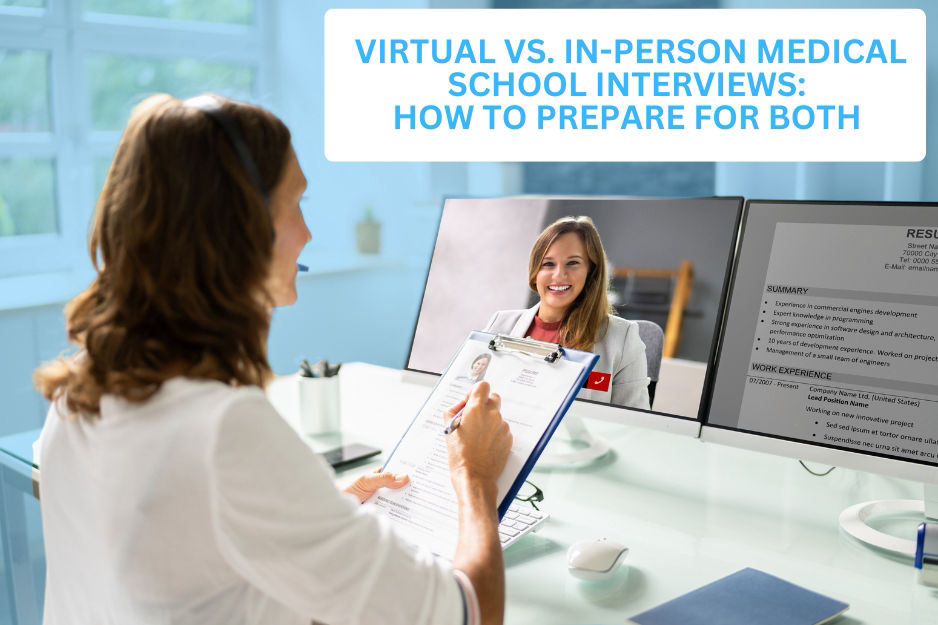
How to Prepare for a Successful Medical School Interview
Preparing for a medical school interview can be both exciting and nerve-wracking. The interview is often the final step in a long journey, and it’s your opportunity to showcase not only your academic credentials but also your passion for medicine and your personal qualities. This blog will guide you on how to effectively prepare for your medical school interview, focusing on key aspects that will help you stand out.
Understanding the Interview Format
Before diving into preparation, it’s essential to understand the interview format. Medical schools can use different types of interview processes, including traditional panel interviews and the Multi-Mini Interview (MMI). Understanding the format will allow you to tailor your preparation accordingly.
- Traditional Panel Interview: This format typically involves a panel of faculty members asking you questions. The questions will often focus on your motivations, experiences, and understanding of the medical profession. A common tip here is to remain calm and answer each question thoughtfully.
- Multi-Mini Interview (MMI): The MMI format involves a series of short, timed stations where you’ll respond to different scenarios or questions. These could range from ethical dilemmas to communication challenges. The key to success here is quick thinking and a clear demonstration of empathy and problem-solving skills.
If you’re unsure which format you’ll face, it’s always a good idea to check your medical school’s website or speak to others who have recently gone through the process. MD Consultants Prep offers mock MMI sessions to help you get familiar with this interview style.
For more details about preparing for the MMI, visit MD Consultants Prep for more tips on handling these questions.
Know Your Medical School Application Inside and Out
One of the most common mistakes applicants make is failing to deeply know their medical school application. Be sure to reflect on your personal statement, your extracurricular activities, and any other documents you submitted. Your interviewers may reference these documents during the interview, so having specific examples or anecdotes ready to back up your claims will help you respond with confidence.
At MD Consultants Prep, you can also access resources to refine your personal statement and get tips on how to effectively highlight your experiences in your application.
Practice Common Interview Questions
While you can’t predict every question, there are certain types of questions that come up frequently in medical school interviews. These may include questions about your motivation for pursuing medicine, your long-term goals, and ethical dilemmas.
Sample Questions to Practice:
- Why do you want to become a doctor?
- Tell us about a time when you faced a challenge and how you handled it.
- What do you think are the biggest challenges facing healthcare today?
Take the time to reflect on these questions and develop concise, impactful answers. This will allow you to feel more at ease and prepared during your actual interview. It’s also essential to be able to speak from personal experience and avoid generic answers.
For more mock questions and personalized feedback, visit MD Consultants Prep.
Prepare for Ethical Questions and Current Affairs
Ethical questions are common in medical school interviews, especially in MMI formats. These questions test your ability to think critically, ethically, and with empathy. Be prepared to discuss a variety of situations, such as:
- Dealing with difficult patients
- Balancing personal beliefs with patient care
- How to handle situations where patient interests conflict with those of their family members
In addition to ethics questions, interviewers may ask about current healthcare issues. Stay updated on recent trends and challenges in the healthcare sector, such as medical advancements, policy changes, and public health crises. A solid understanding of these issues will show your readiness to engage in thoughtful discussions and your genuine interest in medicine.
To better prepare for these questions, you can read MD Consultants Prep’s guide to ethical interview questions.
Be Prepared for Behavioral Questions
Behavioral questions focus on past experiences and how you’ve handled different situations. These questions help interviewers gauge your interpersonal skills, leadership, and teamwork abilities.
Examples of Behavioral Questions:
- Describe a situation where you had to work in a team. How did you contribute?
- Tell us about a time when you had to make a difficult decision. How did you approach it?
- How do you handle stress?

When answering these questions, consider using the STAR method: Situation, Task, Action, and Result. This structured approach helps you tell your story clearly and concisely.
MD Consultants Prep provides personalized coaching and practice sessions where you can fine-tune your responses to behavioral questions. Check out their services here for more details.
Non-Verbal Communication
In addition to your verbal responses, your non-verbal communication also plays a crucial role in your interview. Be mindful of your body language, facial expressions, and posture throughout the interview. A strong handshake, maintaining eye contact, and sitting up straight are simple ways to convey confidence.
For more insights into non-verbal communication and how it affects your performance in medical school interviews, check out MD Consultants Prep’s non-verbal communication tips.
Relax and Be Yourself
Finally, remember to stay calm and be yourself. The interview is not just about answering questions correctly—it’s also about demonstrating your personality, passion, and potential as a future doctor. Show your genuine enthusiasm for medicine and your desire to contribute to the medical community. Interviewers want to see the real you, not just a rehearsed script.
Take a few moments to relax before the interview and breathe deeply. The more you can center yourself, the more likely you are to give thoughtful, authentic responses.
Conclusion
Preparing for a successful medical school interview requires a combination of research, self-reflection, and practice. By understanding the interview format, knowing your application inside and out, and practicing common questions, you’ll be well-prepared to make a strong impression. Additionally, don’t forget to stay up-to-date on healthcare issues, practice your communication skills, and above all, be authentic.
For more tips on preparing for medical school interviews, be sure to check out MD Consultants Prep. They offer valuable resources and personalized coaching to help you succeed in your interview.
Good luck, and remember—success in the interview is about showcasing the best version of yourself!
Related Reading: The Medical School Application Process – Facebook Live Q&A





